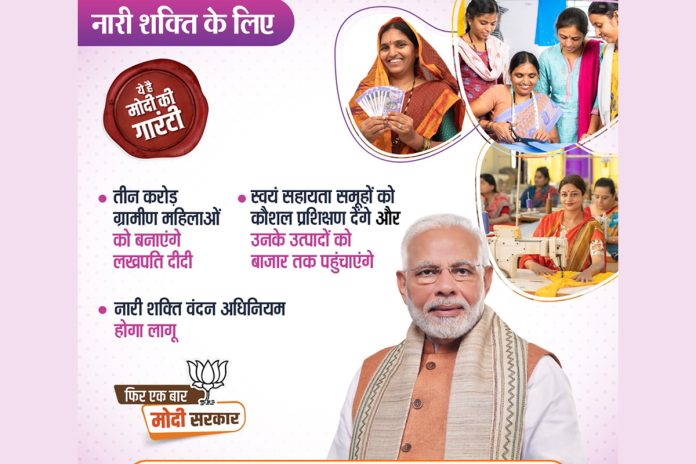Lok Sabha 2024: The Bharatiya Janata Party (BJP) has outlined a robust legal agenda in its manifesto for the 2024 General Election, featuring key initiatives such as the Citizenship Amendment Act (CAA), Bharatiya Nyaya Sanhita (BNS), One Nation One Election, and Uniform Civil Code (UCC).
Here’s a closer examination of the pivotal commitments made by the BJP concerning legal reforms:
The party has pledged to implement the CAA to grant citizenship to eligible individuals. Notably, the Supreme Court of India is currently reviewing a batch of approximately 236 petitions challenging the CAA and the recently enacted Citizenship (Amendment) Rules, 2024.
The CAA, which sparked significant riots in Delhi in February 2020, received presidential assent on December 12, 2019, and was subsequently notified in the gazette. The enactment of the Rules effectively enforced the Act.
The CAA and Rules aim to confer citizenship upon Hindus, Jains, Christians, Sikhs, Buddhists, and Parsis who migrated to India from Bangladesh, Pakistan, and Afghanistan on or before December 31, 2014.
Furthermore, the manifesto references Article 44 of the Indian Constitution, which lists the Uniform Civil Code (UCC) as one of the Directive Principles of State Policy. The party has reaffirmed its commitment to enact a UCC.
“The BJP believes that gender equality cannot be achieved until India adopts a Uniform Civil Code, safeguarding the rights of all women. The BJP reiterates its commitment to formulating a Uniform Civil Code, drawing from the finest traditions and aligning them with modern times,” states the manifesto.
Recently, Uttarakhand became the first state to implement a UCC. The legislation was passed by the State Assembly on February 7 and subsequently received presidential assent on February 13.
With the aim of consolidating various aspects of civil life under a single law, the UCC delineates permissible and prohibited actions in relationships across different faiths, subject to personal customary laws.
भाजपा का संकल्प पत्र विकसित भारत के 4 मजबूत स्तंभ- युवा शक्ति, नारी शक्ति, गरीब और किसान, इन सभी को सशक्त करता है।
— BJP (@BJP4India) April 14, 2024
– पीएम श्री @narendramodi #ModiKiGuarantee pic.twitter.com/feDciYzktj
The proposed legislation includes provisions to penalize individuals who fail to register their live-in relationships, with penalties including imprisonment. Additionally, the legislation addresses matters such as marriage, divorce, and inheritance in Uttarakhand.
The manifesto also highlights the establishment of a High Powered Committee tasked with examining issues related to simultaneous elections. Led by former President Ram Nath Kovind, the committee endorsed One Nation One Election in March. Additionally, the BJP manifesto emphasizes the Bharatiya Nyaya Sanhita, aimed at replacing the Indian Penal Code (IPC). The party expresses its commitment to effectively implementing this through various measures such as training, online certificate courses, and updates to university and law school curricula.
On August 11, 2023, the Central government introduced three bills to overhaul the criminal justice system, including the Bharatiya Nyaya Sanhita. After being referred to a parliamentary committee headed by Brij Lal for further examination, the bills were withdrawn on December 11. However, they were reintroduced the next day by Home Minister Amit Shah and subsequently passed by both the Lok Sabha and Rajya Sabha on December 20 and 21, respectively.
The Bills received the President’s assent in December 2023, and a gazette notification from the Union Home Ministry on February 24 announced that the new laws would come into force from July 1 of the same year.
The manifesto also includes several other pledges:
- Implementation of the Public Examinations (Prevention of Unfair Means) Act, aimed at addressing misconduct in recruitment exams nationwide.
- Reduction of compliance burdens for small traders and Micro, Small, and Medium Enterprises (MSMEs) to improve ease of living and doing business. This involves collaborating with state governments to simplify state legislations.
- Implementation of next-generation ‘Land Record Digitization’ and the integration of various institutions such as Revenue Courts and Registration Offices.
- Development of legal standards for Cultural Intellectual Property (IP) protection through collaboration with domestic and international organizations like WIPO and UNESCO.
- Formulation of a National Litigation Policy to expedite the resolution of court matters, reduce contested court proceedings’ costs, and decrease government involvement in cases, thus alleviating the burden on courts.
- Overhaul of commercial and civil justice systems to streamline procedures, enhance legal process efficiency, ensure timely justice, and create a more business-friendly and citizen-centric legal environment.
- Acceleration of the e-Courts Mission Mode Project to digitize entire court records for easy online access to court proceedings.
- Establishment of fast-track courts in identified areas to expedite the resolution of old cases and reduce backlog.
- Further improvement of the legal framework to promote the arbitration and mediation ecosystem for efficient dispute resolution.

